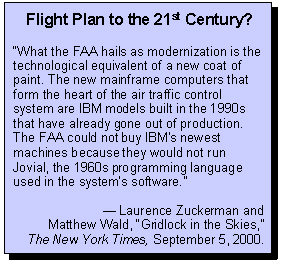No one likes being stuck at an airport for hours on end,
especially when you have someplace else youíd rather be. But there
seem to have been an unusual number of delayed or cancelled flights
this summer, and thatís got the TV networks (among others) looking
around for solutions. Mostly, that means asking why federal
bureaucrats havenít cracked down harder on the airlines, but one
reporter ó ABCís Bob Woodruff ó actually told his viewers about a
"radical" market-based solution.
 On
CBSís The Early Show last month, reporter Jeffrey Kofman
exhibited the prevailing mindset of many reporters when he informed
anchor Cynthia Bowers that "last year, the airline industry lobbied
hard to kill legislation that would have enacted an airline
passenger bill of rights. Instead, the industry came up with a
voluntary code."
On
CBSís The Early Show last month, reporter Jeffrey Kofman
exhibited the prevailing mindset of many reporters when he informed
anchor Cynthia Bowers that "last year, the airline industry lobbied
hard to kill legislation that would have enacted an airline
passenger bill of rights. Instead, the industry came up with a
voluntary code."
"Itís clear that code is not working," Kofman continued "Now when
they killed that legislation, the politicians did say that if the
voluntary code didnít work, they would be back with an airline
passenger bill of rights that had real muscle in it, Cynthia." In
other words, Kofman assumed tougher regulations could somehow force
the market to work correctly.
But on World News Tonight on September 1, ABCís Woodruff
uniquely included the free market perspective in his report on
solutions to air travelersí woes. He interviewed Alfred Kahn, the
Carter administration official who presided over airline
deregulation in the 1970s. Kahnís suggestions: charging more during
peak hours ("[in] any other free market, those prices would be much,
much higher when there is very great demand relative to supply," he
explained), and privatizing the air traffic control system.
Although Woodruff did label that a "more radical suggestion," he
did not dismiss the notion as crazy talk. He related that such a
plan would "leave safety to the government but privatize air traffic
control. Critics of the present system say that privatization would
increase innovation and the use of new technology." Woodruff then
quoted Kahn stating that the current air traffic system is "behind
in their technology because they are not free to raise capital."
Government officials have been pointing fingers at the airlines,
but is the old hardware of the air traffic control system to blame
for some delays? "Today, the airline industry carries three times as
many passengers as it did in 1978 at average fares that are 40
percent lower, adjusting for inflation," reported Laurence Zuckerman
and Matthew Wald in the September 5 New York Times. "But
while the industry was transformed, the air traffic control system
has remained virtually unchanged." They also noted that the airline
industry blames the old system for more than $5 billion worth of
lost time and resources for consumers and industry combined.
"What the FAA hails as modernization," wrote Zuckerman and Wald,
"is the technological equivalent of a new coat of paint. The new
mainframe computers that form the heart of the air traffic control
system are IBM models built in the 1990s that have already gone out
of production. The FAA could not buy IBMís newest machines because
they would not run Jovial, the 1960s programming language used in
the systemís software."
The government runs the air traffic control system, not the
private sector, and that means decisions about major investments are
decided by politicians and bureaucrats. Kudos to ABCís Bob Woodruff
for showing that there are free market alternatives to more
government rule-making.
ó Rich
Noyes












 On
CBSís The Early Show last month, reporter Jeffrey Kofman
exhibited the prevailing mindset of many reporters when he informed
anchor Cynthia Bowers that "last year, the airline industry lobbied
hard to kill legislation that would have enacted an airline
passenger bill of rights. Instead, the industry came up with a
voluntary code."
On
CBSís The Early Show last month, reporter Jeffrey Kofman
exhibited the prevailing mindset of many reporters when he informed
anchor Cynthia Bowers that "last year, the airline industry lobbied
hard to kill legislation that would have enacted an airline
passenger bill of rights. Instead, the industry came up with a
voluntary code."